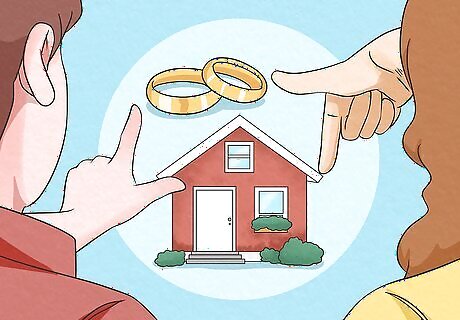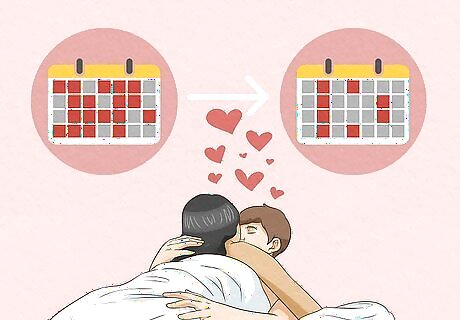
views
You share more about your lives.

You let your partner in on the little details about yourself. Do you have an overbearing family? Did you have a huge fight with your childhood best friend? Do you hate shrimp? These small things that you wouldn’t normally share with other people bring you two closer together and strengthen your bond over time. You might also tell your partner embarrassing stories, like the time when you dropped a plate of spaghetti on your crush’s lap. As you get to know each other more, you’ll probably feel more comfortable letting them in on the side of you that isn’t perfect.
You’re more honest with each other.

You might not feel bad about telling your partner the truth anymore. Maybe you actually don’t love their favorite TV show, or maybe you’d rather have Chinese food instead of going to the Italian restaurant you always go to. As the honeymoon phase wears off, you’ll probably find yourself telling the truth more instead of making up white lies to save your partner’s feelings. This includes not pretending everything is great all the time when it’s not. As you get to know your partner more and more, you’ll feel more comfortable bringing up problems or issues with them. White lies are sometimes okay, like telling your partner you like their new shirt (when you actually don’t). But for the most part, it’s better to be open and honest with each other to avoid any confusion. Being honest and transparent is actually the key to a good, healthy relationship.
You learn how to handle relationship problems together.

You’ll discover how you and your partner prefer to solve issues together. Some people like to talk things out right away, while other people need time to process and reflect before they come together and chat. As you spend more time with your partner, you’ll both learn how you can bring up problems and have productive, honest conversations about them. Some people like to bring up issues in the moment, while others like to have relationship check-ins where they air all their grievances at once. Speaking honestly and presently with your partner can be a great way to reaffirm your feelings for your partner.
You develop more trust together.

You’ll know that you can rely on your partner no matter what. As you grow and change together, you’ll learn that you can lean on your partner when you’re having a hard time. When the honeymoon phase starts to wear off, you two will develop trust and loyalty because of what you’ve gone through together so far. Maybe you called your partner to pick you up after your car broke down, or you told them an embarrassing story and they didn’t judge you. Small things like this help you two bond, and it can bring you closer together.
You feel content.

Those butterflies in your stomach might settle into something calmer. While you might not be jumping for joy every time you see your partner, you’ll also feel much more at ease with life. Often, the initial spark of the honeymoon phase is replaced with an overall contentment, where you don’t feel like you need to change anything in your life. People sometimes mistake this contentment with boredom, but that’s actually not the case. Feeling content in your relationship means that it’s getting more serious, and that you might be settling in for a long time together. Feeling content might also mean putting less effort into your appearance when it’s time to see your partner. You feel okay with them seeing you in sweatpants because you know that your bond is deep.
You feel committed to your partner.

The love you feel for your partner gets deeper and stronger. Instead of wondering about who else might be out there or whether you’re with the right person, you’ll probably start to feel like this is the one for you. As the honeymoon phase fades and your connection strengthens, your loyalty will strengthen, too. It’s okay to have doubts about your partner or your relationship occasionally. However, if this is meant to be, you can usually quell those doubts fairly easily.
You push each other to reach your goals.

You know your partner well enough to understand what they want. Now that you and your partner are fully committed to each other, you’ll probably do everything in your power to help them reach their full potential. You might encourage your partner or help them make plans that will lead toward them achieving their goals. For instance, maybe your partner wants to make a change in their career. You might help them sign up for classes or pick a college program that would help them do that.
You start planning your future together.

As you get more serious, you might start making more plans. Things like moving in together, getting married eventually, and even having kids could get brought up. This is a great sign in your relationship, and it means that things are moving toward a more serious place. It’s important to talk about your goals together now so there are no surprises later on. Being on the same page about where you want to live and whether or not you want to have kids is key to having a healthy relationship.
You start viewing things as more mundane.

The stuff you do together might not be as exciting, and that’s okay. It’s because your partner isn’t new to you anymore—you know them well, and you aren’t as surprised by them as you once were. You might settle into a routine together instead of being spontaneous all the time. If you want to get that excitement back, there are ways to do it! Try whisking your partner away for a weekend getaway, or bring them a present when you come back from the store. Adding a little romance into every day can really help keep that spark alive.
You might have less sex.

In the honeymoon phase, most couples experience higher sex drives. As the novelty of your partner wears off, you might find yourself a little less worked up around them than you used to be. This isn’t a bad thing—it means that you’re more comfortable around each other. Most couples get into a rhythm of having sex a few times per week, but it’s up to you and your partner to decide how often you’d like to have sex.
You accept your partner’s flaws.

You might start to notice things you were blinded to before. Maybe your partner chews too loud, or they snore when they sleep. Instead of these quirks being cute or funny, they might start to get on your nerves. Don’t worry—no one’s perfect, and everyone you meet will have flaws that you need to accept. If there’s something your partner does that truly aggravates you, it’s worth talking to them about. However, if you’re just a little annoyed by it or it doesn’t bother you that much, it’s okay to let it go.
You have little fights.

Couples tend to argue more after the honeymoon phase wears off. This is for a few reasons, but the main one is that you’re no longer worried about upsetting each other. You might get into little tiffs about silly things, like how to load the dishwasher or where you want to eat that night. Just remember that fighting in a relationship is normal, and it’s okay to have arguments as long as you’re both kind and respectful during them. EXPERT TIP Chloe Carmichael, PhD Chloe Carmichael, PhD Licensed Clinical Psychologist Chloe Carmichael, PhD is a Licensed Clinical Psychologist who runs a private practice in New York City. With over a decade of psychological consulting experience, Dr. Chloe specializes in relationship issues, stress management, self esteem, and career coaching. She has also instructed undergraduate courses at Long Island University and has served as adjunct faculty at the City University of New York. Dr. Chloe completed her PhD in Clinical Psychology at Long Island University in Brooklyn, New York and her clinical training at Lenox Hill Hospital and Kings County Hospital. She is accredited by the American Psychological Association and is the author of “Nervous Energy: Harness the Power of Your Anxiety” and “Dr. Chloe's 10 Commandments of Dating.” Chloe Carmichael, PhD Chloe Carmichael, PhD Licensed Clinical Psychologist Sometimes arguments start if you feel jealous of your partner for some reason. If you're feeling jealous, the best thing to do is to talk to your partner about it and to make sure you understand where the feeling is coming from within yourself. If your partner is warm and reassuring and offers to find ways to make you feel more comfortable in the relationship, that's a great sign. If they bristle and seem defensive or irritable about the conversation, that's not a great sign for your relationship. This likely means you both have different baseline assumptions about exclusivity and your partner isn't very open to trying to support you as you’re trying to process your emotions.




















Comments
0 comment